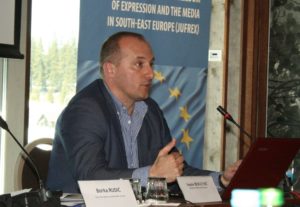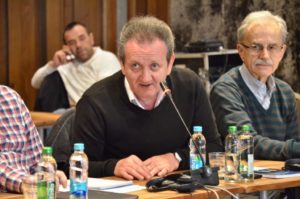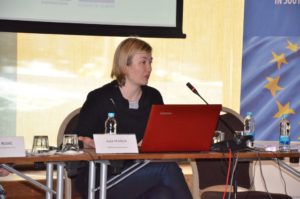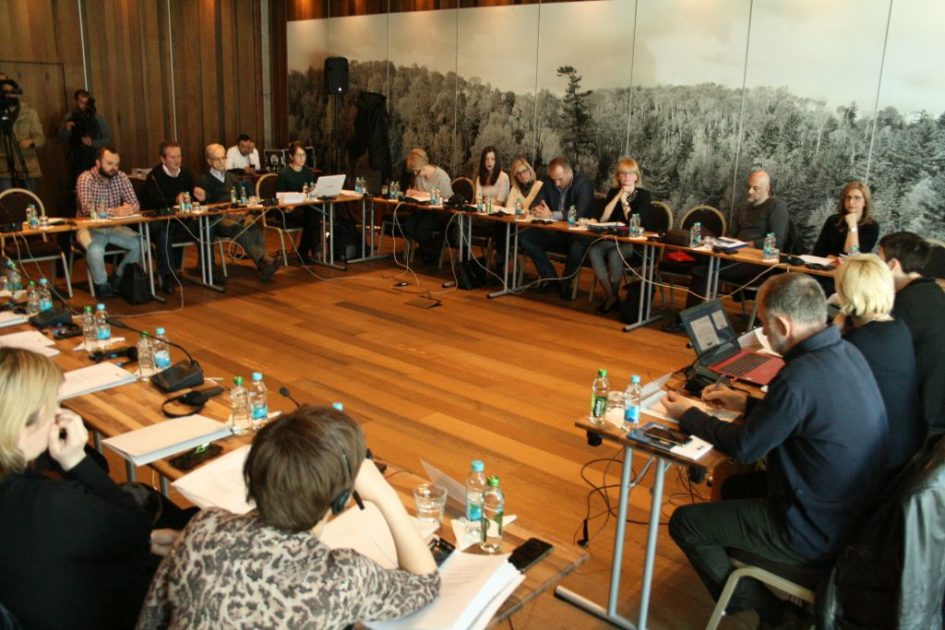JAHORINA, 04.04.2018. – Editorial decisions and clear distancing from hate speech are important for prevention and responsible treatment of hate speech in electronic media content, especially in live programs. Although it is not always possible to impose a sanction on people spreading hate speech, such a speech should always come to public condemnation – highlighted participants from the inter-professional seminar on hate speech in the content of electronic media, held in Jahorina.
The participants in the conference – representatives of the judiciary, the Communications Regulatory Agency, lawyers, editors and journalists – pointed out that the application of the standards of the European Court of Human Rights (ECHR) in the processing of cases of hate speech in judicial institutions is important,
“The ECHR is conducted with three segments when deciding what is hate speech, and that is the purpose, content and context of speech,” said Emir Povlakić from The Regulatory Agency for Communications. Prosecutor of the Sarajevo Cantonal Prosecutor’s Office Sanin Bogunić presented an international and national legal framework that treats hate speech.
 „The European Convention on Human Rights protects not only content but also the means of communicating information,” Bogunić emphasized, adding that the ECHR, through its work, issued a series of judgments representing the corpus of the principles of freedom of the press and its role as a watch guard in democratic societies how the international legal framework recognizes those forms of expression subject to constraints.
„The European Convention on Human Rights protects not only content but also the means of communicating information,” Bogunić emphasized, adding that the ECHR, through its work, issued a series of judgments representing the corpus of the principles of freedom of the press and its role as a watch guard in democratic societies how the international legal framework recognizes those forms of expression subject to constraints.
Maria Donde,an international expert and representative of the electronic media regulator from Great Britain (Ofcom) spoke about the practice of preventing and sanctioning hate speech in electronic media in this country. “Ofcom receives up to 30,000 complaints on reporting and broadcasting annually. We monitor only when we estimate there is an objective need, “said Donde.
Participants pointet out that the editors decision is crucial in situations of direct reporting of listeners / viewers in the program
Učesnici su istakli i da je odluka urednika ključna u situacijama direktnog javljanja slušalaca/gledalaca u program,when one can not predict what will be said in a direct transmission. “Not every hate speech should end up in the courtroom,

sudnici,but every hate speech should be publicly condemned”, said the jurist and media expert Mehmed Halilović.
The publication “Media Regulatory Authorities and Hate Speech“, which was created based on the exchange of experience of the regulators of the countries of the region (Albania, BiH, Croatia, Kosovo, Montenegro, Macedonia and Serbia) was presented today in Jahorina.
The publication also contains data on significant cases dealt with by regulators in the region and the role of national regulatory agencies in this regard, as well as recommendations that point to possible directions for regulatory action.
 „Besides imposing sanctions against service providers, there are other aspects of the work of regulators that contribute to an effective framework for preventing hate speech. They include transparency, professionalism, accountability, inclusiveness, media literacy and the continuation of cooperation with all relevant actors who fight against hate speech from different perspectives“, said the representative of the regulatory body, Azra Maslo.
„Besides imposing sanctions against service providers, there are other aspects of the work of regulators that contribute to an effective framework for preventing hate speech. They include transparency, professionalism, accountability, inclusiveness, media literacy and the continuation of cooperation with all relevant actors who fight against hate speech from different perspectives“, said the representative of the regulatory body, Azra Maslo.
The aim of the round table “Hate speech in the content of electronic media” is to improve the understanding of emerging forms of hate speech in the media and public discourse, the legal and regulatory framework, and the prevention and sanctioning of hate speech in electronic media in accordance with international standards and national legislation. One of the goals is also to improve the role of media professionals in the prevention of hate speech in electronic media, in the context of respecting ethical standards and professional standards.
The two-day seminar was organized by the BH Journalists Association, the Regulatory Agency for Communications and the Council of Europe within the JUFREX project of Council of Europe – Reinforcing Judical Expertise on Freedom of Expression and the Media in South – East Europe, financially supported by the European Union.








